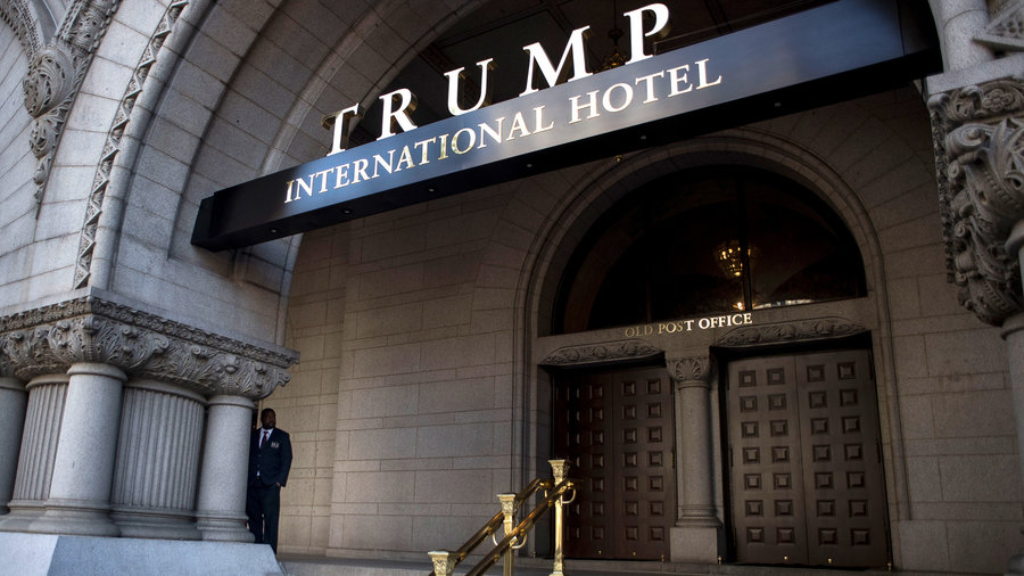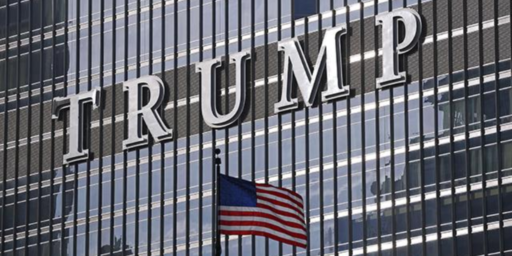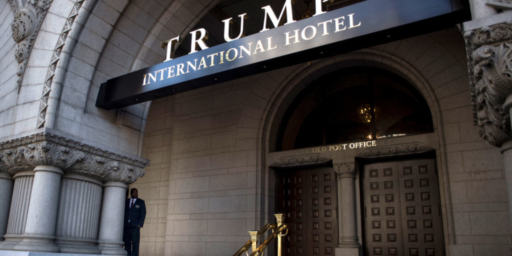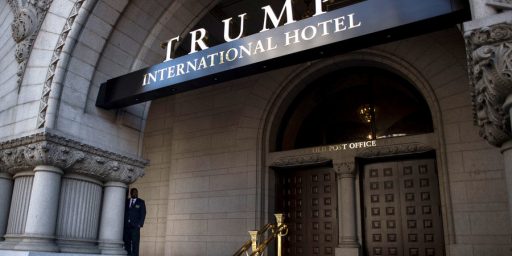Federal Appeals Court Reinstates Emoluments Clause Case Against Trump
A Federal Appeals Court has reinstated an Emoluments Clause lawsuit against the President that had been dismissed nearly two years ago.

Late last week, the Second Circuit Court of Appeals reinstated a lawsuit filed by a Washington D.C. restauranteur and a watchdog group alleging that the President’s operation of a hotel in Washington, D.C. violated the Emoluments Clause of the Constitution, potentially setting the case up for a first-ever Supreme Court ruling on this previously obscure part of the Constitution:
A federal appeals court in New York on Friday revived a lawsuit alleging that President Trump is illegally profiting from his hotels and restaurants in New York and Washington in violation of the Constitution’s anti-corruption, or emoluments, clauses.
In a two-to-one decision, a panel of judges for the United States Court of Appeals for the Second Circuit found that a lower court had wrongly dismissed the lawsuit accusing Mr. Trump of violating the Constitution’s bans on accepting financial benefits from foreign or state governments. The appeals court judge sent the lawsuit back to the lower court, ordering it be allowed to proceed.
The decision comes nearly two years after the lower court judge dismissed the lawsuit. The case is one of three that have been ping-ponging back and forth between district and appeals courts as judges struggle with the novel legal questions raised by Mr. Trump’s decision not to divorce himself from his business empire while in office.
Although Mr. Trump promised never to mix his personal financial interests with official business, he has repeatedly touted his properties since becoming president. He suggested recently that he should host the next summit of the Group of 7 world leaders at his luxury golf resort in southern Florida, describing the property as a “great place.”
In some ways, interactions between Mr. Trump’s political role and his businesses have become routine, with foreign leaders, lobbyists, Republican candidates, members of Congress, cabinet members and others with ties to the president routinely visiting his properties. In the past week, new details have emerged of stays by United States military personnel at Mr. Trump’s golf resort in Scotland.
(…)
In the New York case, the appellate judges ruled that the lower court judge, George B. Daniels, had dismissed the case too precipitously. By his standard, the judges said, no plaintiff would ever have the legal standing to sue the president for accepting financial benefits or emoluments from foreign governments without congressional approval.
They said Judge Daniels’s ruling was the equivalent of saying that “Congress alone shall have the authority to determine whether the president acts in violation of this clause” when in fact, the Constitution “says nothing like that.”
The judges also said Judge Daniels wrongly rejected as “wholly speculative” the plaintiffs’ complaint that they were losing business because state and foreign officials were switching to Trump-owned properties in hopes of winning the president’s favor.
“The district court demanded too much at the pleading stage,” the decision states. It was written by Pierre N. Leval, who was appointed by President Bill Clinton, and Christopher F. Droney, who was appointed by President Barack Obama.
The underlying lawsuit was based on two separate parts of the Constitution that from their text are clearly aimed at preventing Federal officials such as Members of Congres, Senators, and officials in the Executive Branch from receiving benefits from foreign and domestic governments while in office. The first provision, known as the “Foreign Emoluments Clause,” is found in Article I, Section Nine, Clause 8 of the Constitution and prohibits any Federal official from receiving without Congressional consent “any present, Emolument, Office, or Title, of any kind whatever, from any King, Prince or foreign State.” With respect to this provision, it is worth noting that the clause does say that Congress can consent to the foreign emolument, but it doesn’t specify what form that consent must take. The second clause, known as the “Domestic Emoluments Clause,” can be found in Article II, Section 1, Clause 7 and states that the President “shall not receive within that Period any other Emolument from the United States or any of them.” Generally speaking, an “emolument” is defined as ” the returns arising from office or employment usually in the form of compensation or perquisites.”
There is no record that these clauses of the Constitution have been raised or litigated with respect to any President since George Washington first took the Oath of Office in 1789 and no record of any legal proceeding in which a court of record has ruled on the application of these clauses in any specific case. In this respect then, Judge Daniels’ ruling is quite literally a historical first in the 230 year history of the Constitution and the first time any court at any level has ruled on either the applicability of the clauses or the question of who may or may not maintain a lawsuit under them. Additionally, it’s worth noting that there is a long history of Presidents of the United States receiving gifts, including gifts that potentially have significant value, from foreign leaders and foreign nations. Typically, these gifts are given as part of official visits by foreign heads of government or heads of state to the United States, or official visits of the President to foreign nations during his time in office. Under a strict reading of the Foreign Emoluments Clause, these gifts would appear to be barred, but rather than being prosecuted for accepting them previous Presidents have been permitted to receive them as long as they are properly reported by the White House. At the very least, though, this history raises legitimate questions about what the clauses mean and whether President is violating them in the manner suggested by the Plaintiffs in this lawsuit.
The principal Plaintiff in this particular case is a restaurant owner and operator in Washington, D.C. and New York City who alleged that he was being damaged, and therefore had standing, by the fact that the President owned competing properties in these cities that were benefiting from their connection to the President and the fact that foreign and domestic businesses and individuals seeking to curry favor with the President would obviously flock to his properties.
As noted, it was nearly two years ago that the underlying lawsuit, which had been brought in Federal District Court in New York City, was dismissed on the ground that the Plaintiff lacked standing to bring the lawsuit. The Court of Appeals rejected that argument and made the point that the District Court’s restrictive standing analysis would essentially mean that nobody has standing to file a lawsuit based on these provisions of the Constitution. Additionally, the Court ruled that, contrary to the District Court’s ruling that the lack of a damages provision tied to either clause, the Plaintiff could still seek to present evidence of damages he suffered as a result of the alleged violations of the clauses in question. As a result, the Court ruled, this Plaintiff did have standing and that the case should proceed forward to trial.
The ruling also comes some two months after the Fourth Circuit Court of Appeals had ruled that the State of Maryland and the District of Columbia lack standing to bring claims under the provision as well. Potentially, both cases could be appealed to the Supreme Court and, given the fact that there is now a Circuit split on the issue of standing (albeit involving different types of Plaintiffs), this could persuade the Justices to take up the case and provide some kind of definitive ruling on the issue of standing. Alternatively, the Court could decide to let the issue continue to percolate in the lower Federal courts before taking up a case involving provisions of the Constitution that have never been subject to Supreme Court review before.
Here’s the opinion:
CREW Et Al v. Trump Et Al by Doug Mataconis on Scribd





Probably the most disheartening thing about the Trump Era is how we’ve gotten inured to the man blatantly and openly enriching himself through the office. Regardless of the legalities of this particular court case, it’s disgusting what he is doing. And I fear the damage to the integrity of the office may be permanent.
Well, Trump did say that the Constitution gives him the right to do whatever he likes, so…
I find it interesting that in the 232 year history of our constitution, no president, and we’ve had some pretty scummy presidents, ever violated the Emoluments clause to such an extent that anyone thought they needed to sue over it. Until trump.
He is making history. I’ll bet his daddy is soooo proud.